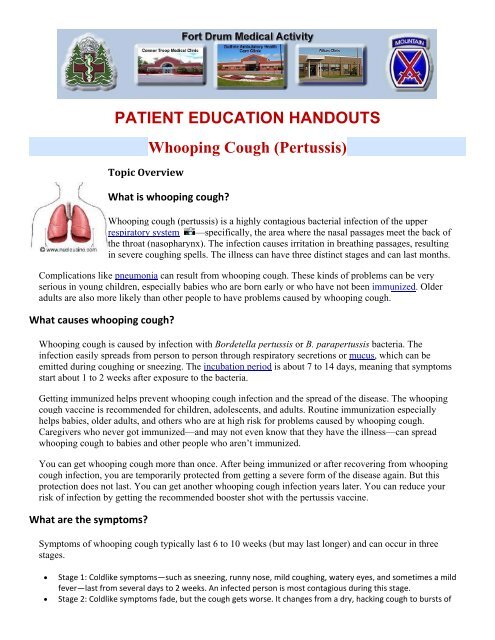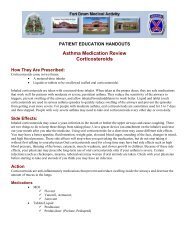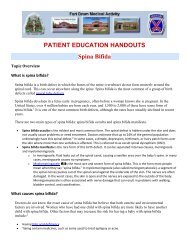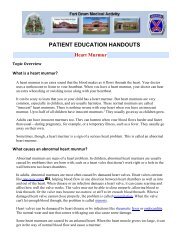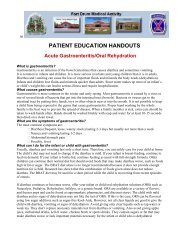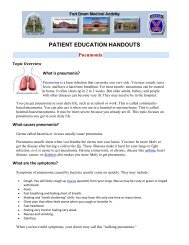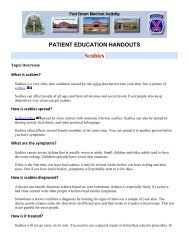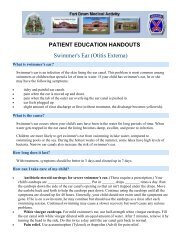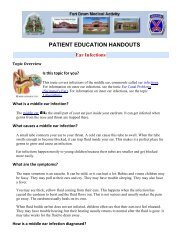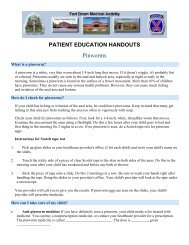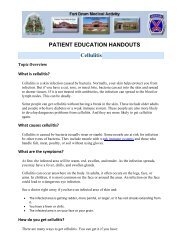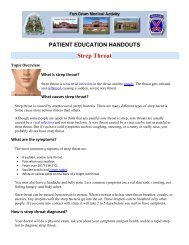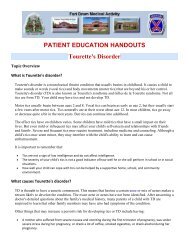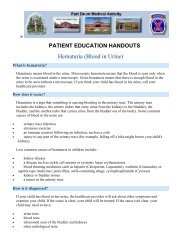PATIENT EDUCATION HANDOUTS Whooping Cough (Pertussis)
PATIENT EDUCATION HANDOUTS Whooping Cough (Pertussis)
PATIENT EDUCATION HANDOUTS Whooping Cough (Pertussis)
You also want an ePaper? Increase the reach of your titles
YUMPU automatically turns print PDFs into web optimized ePapers that Google loves.
<strong>PATIENT</strong> <strong>EDUCATION</strong> <strong>HANDOUTS</strong>Topic Overview<strong>Whooping</strong> <strong>Cough</strong> (<strong>Pertussis</strong>)What is whooping cough?<strong>Whooping</strong> cough (pertussis) is a highly contagious bacterial infection of the upperrespiratory system —specifically, the area where the nasal passages meet the back ofthe throat (nasopharynx). The infection causes irritation in breathing passages, resultingin severe coughing spells. The illness can have three distinct stages and can last months.Complications like pneumonia can result from whooping cough. These kinds of problems can be veryserious in young children, especially babies who are born early or who have not been immunized. Olderadults are also more likely than other people to have problems caused by whooping cough.What causes whooping cough?<strong>Whooping</strong> cough is caused by infection with Bordetella pertussis or B. parapertussis bacteria. Theinfection easily spreads from person to person through respiratory secretions or mucus, which can beemitted during coughing or sneezing. The incubation period is about 7 to 14 days, meaning that symptomsstart about 1 to 2 weeks after exposure to the bacteria.Getting immunized helps prevent whooping cough infection and the spread of the disease. The whoopingcough vaccine is recommended for children, adolescents, and adults. Routine immunization especiallyhelps babies, older adults, and others who are at high risk for problems caused by whooping cough.Caregivers who never got immunized—and may not even know that they have the illness—can spreadwhooping cough to babies and other people who aren’t immunized.You can get whooping cough more than once. After being immunized or after recovering from whoopingcough infection, you are temporarily protected from getting a severe form of the disease again. But thisprotection does not last. You can get another whooping cough infection years later. You can reduce yourrisk of infection by getting the recommended booster shot with the pertussis vaccine.What are the symptoms?Symptoms of whooping cough typically last 6 to 10 weeks (but may last longer) and can occur in threestages.• Stage 1: Coldlike symptoms—such as sneezing, runny nose, mild coughing, watery eyes, and sometimes a mildfever—last from several days to 2 weeks. An infected person is most contagious during this stage.• Stage 2: Coldlike symptoms fade, but the cough gets worse. It changes from a dry, hacking cough to bursts of
uncontrollable, often violent coughing. During a coughing episode, it may be temporarily impossible to take abreath because of the intensity and repetition of coughs. When finally able to breathe, the person may take in asudden gasp of air through airways narrowed by inflammation, and this sometimes causes a whooping noise.Vomiting and severe exhaustion often follow a coughing spell. But between coughing episodes, the infectedperson often appears normal. This is the most serious stage of whooping cough, usually lasting from 2 to 4weeks or longer.• Stage 3: Although the person improves and gains strength, the cough may become louder and sound worse.<strong>Cough</strong>ing spells may occur off and on for weeks to months and may flare up if a cold or other upper respiratoryillness develops. This final stage may last longer in people who have never received the whooping cough vaccine.Healthy adults who become infected with whooping cough often have a much milder form of the illnesscompared with children. But adults ages 60 and older are at increased risk of having severe symptoms anddeveloping complications. The severity of symptoms is, in part, influenced by whether a person wasimmunized against whooping cough and how long ago the immunization was given. The protection againstwhooping cough provided by the vaccine wears off over time.How is whooping cough diagnosed?A person with whooping cough may appear normal between coughing episodes, which often delays adiagnosis or makes it more difficult. But a doctor may suspect whooping cough during an exam whensymptoms are present and recent cases have been reported in the community. Sometimes other coughingillnesses, such as the common cold or bronchitis, have specific symptoms that can distinguish them fromwhooping cough, such as a high fever, a sore throat, or wheezing.Blood tests or X-rays may be done to rule out other diseases or conditions. A doctor may also collectmucus from the nasopharynx and have it tested for specific types of bacteria that cause whooping cough.Lab results may not be available for up to 10 to 14 days. If whooping cough is suspected, treatment will bestarted before the lab results are available.How is it treated?<strong>Whooping</strong> cough is treated with antibiotics, primarily to help reduce the spread of infection. If givenduring the very early stage of the illness, antibiotics may help shorten the illness. Over-the-countermedicines have not been shown to help relieve symptoms, but other measures, such as a cool-airhumidifier, may help reduce discomfort.Can it be prevented?You can prevent whooping cough infection or reduce its severity in your child by keeping immunizationsup to date. The routine immunizations DTaP (for children) and Tdap (for adolescents and adults) protectagainst whooping cough. It is also helpful to wash your hands frequently and keep children away frompeople who have a bad cough.Frequently Asked QuestionsLearning about whoopingcough:Being diagnosed:• What is whooping cough?• What are the symptoms?• Who is affected?• How is whooping cough diagnosed?
Getting treatment:Ongoing concerns:• How is whooping cough treated?• What is the home treatment for whooping cough?• What kinds of complications can develop?• Can immunization prevent whooping cough? (What is a PDF document?)Author: Debby Golonka, MPH Last Updated: January 4, 2008Medical Review: Michael J. Sexton, MD ‐ PediatricsChristine Hahn, MD ‐ EpidemiologyReviewed 9 June 2008


